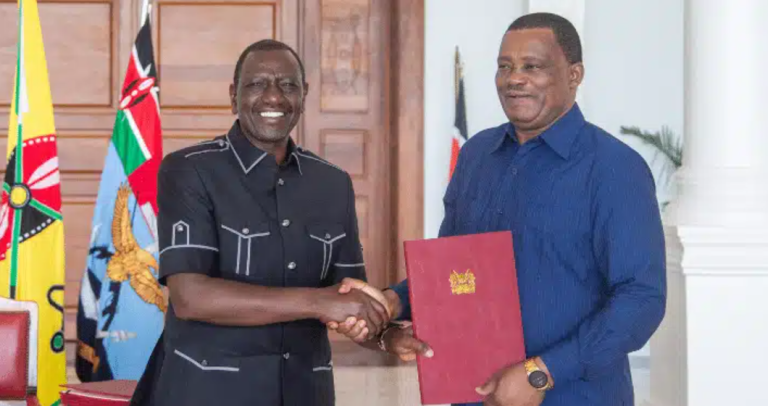On Wednesday, March 26, 2025, President William Ruto shuffled his cabinet. While some of his cabinet secretary colleagues had the privilege of being moved to new ministries, Justin Muturi was shown the door from his plum position at the Ministry of Public Service. His dismissal by President William Ruto now marks a significant turn in their political relationship. Muturi, who previously served as Attorney General from 2022 to 2024, had been a key figure in Ruto’s administration.
However, their alliance began to fray following Muturi’s outspoken criticism of the government’s handling of abductions and extrajudicial killings, particularly after his son, Leslie, was allegedly abducted by state agents during anti-government protests in June 2024. His frustration reached a breaking point when he vowed to withdraw from cabinet discussions on national security matters and declared he was ready to lose his job over his stance.
The tension between Muturi and Ruto escalated when Muturi publicly condemned the administration’s inaction on human rights violations, accusing it of complicity. His repeated public criticisms, coupled with his decision to disengage from certain cabinet meetings, were viewed as direct defiance of Ruto’s leadership. The final straw came when Muturi stated that he had no regrets about his position, even if it cost him his job- a declaration that all but sealed his fate. Soon after, Ruto labeled Muturi as “incompetent” and unfit to serve, leading to his dismissal.
Openly differing with one’s superior, especially in a political context, often carries significant risks. It can lead to strained relationships, loss of trust and, as seen in Muturi’s case, termination of employment. While standing up for one’s principles is commendable, it’s essential to navigate such disagreements strategically to avoid adverse outcomes. A government position, especially at the cabinet level, demands both diplomacy and tact when addressing sensitive matters.
To maintain his position while addressing his concerns, Muturi might have considered the following approaches: Engaging in confidential discussions with President Ruto could have provided a platform to express his concerns without public confrontation, potentially leading to a more amicable resolution. He could have also collaborated with other cabinet members to collectively address the issue. This might have amplified his concerns and presented a united front, making it harder for the administration to dismiss the grievances.
Additionally, he could have utilized official government procedures to raise and document his concerns. This could have ensured they were acknowledged and addressed systematically, reducing the perception of insubordination.
Muturi’s job loss serves as a cautionary tale for leaders and professionals alike: while standing firm on one’s principles is admirable, the method of execution matters. Political and professional arenas demand a balance between principle and logic. His case illustrates the harsh reality that publicly challenging one’s employer- especially in government- comes with consequences, and careful strategy is necessary to ensure both impact and career longevity.

